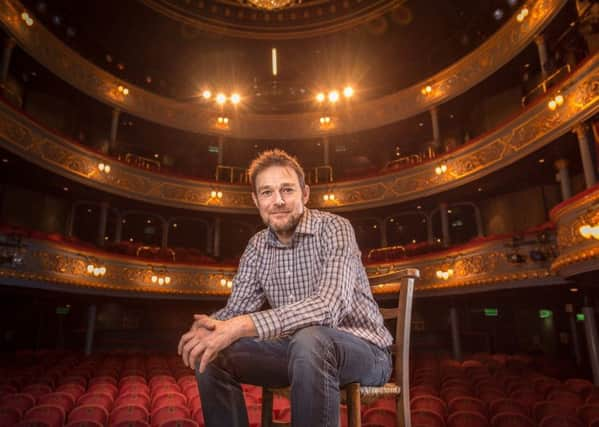Theatre interview: Artistic director David Greig talks about bringing greater diversity to the Royal Lyceum's programme for 2017-18


When David Greig was appointed artistic director of the Royal Lyceum Theatre back in 2015 – as the first playwright to lead one of Scotland’s major companies in two generations – he made it clear from the start that he wanted Edinburgh’s great producing theatre to become a centre for debate and discussion about the life of the city, and the nation. Despite the huge range of Greig’s work, after all – from experimental children’s shows to Broadway blockbusters – he has always been one of Scotland’s most engaged playwrights, born in 1969, emerging onto the scene in the aftermath of the fall of the Berlin Wall, and writing passionately about the pains and possibilities of the new post-Cold-War world.
Even he, though, could hardly have anticipated the series of shocks that would shake that world during his first year at the Lyceum, with Britain’s vote to leave the EU, and the election of Donald Trump. And when he launched his 2017-2018 Lyceum programme last week, he talked passionately about the “fraught binaries” that now seem to divide people, between Britain and Europe, England and Scotland, Yes and No, Left and Right, Men and Women; and about how, in such times, theatre can help meet our “crying need for solidarity, empathy, joy, and finding ourselves in the lives of others”.
Advertisement
Hide AdThere’s nothing obvious, though, about the way in which the Lyceum’s 2017-18 programme responds to this moment in history. Greig says that his main preoccupation was to avoid the temptation to play safe, at a time when safe options just won’t meet the challenge; and the season’s most striking feature is its historic status as possibly the first ever Lyceum programme to feature more female writers and directors than male ones. “I just found that every time I tried to strip some risk out of the programme, and make it look a bit more familiar, what I was doing was stripping out that diversity. I suppose that’s inevitable, when 90 per cent of the familiar canon of western theatre was written by white men. But in the end, I just thought, ‘Damn it, if these plays aren’t familiar they should be’; and I decided to go for it.”
This is a thought that applies particularly to two shows in the season, Bridget Boland’s 1948 play Cockpit, which appears in October in a production by Wils Wilson, director of Greig’s riotous National Theatre of Scotland pub hit The Strange Undoing of Prudencia Hart, and Hannah Cowley’s The Belle’s Stratagem, which Tony Cownie will adapt and direct next February. First seen in 1780, Cowley’s play is a tremendously witty riposte to George Farquhar’s much better-known 1707 play The Beaux’ Stratagem – one in which the women become the drivers of the plot.
Wilson, now a Lyceum associate artist, freely admits that she had never heard of Bridget Boland when Greig first mentioned her. “As soon as I read the play, though,” she says, “I just said to him, ‘Please, please do not ask anyone else to direct this’. It is the most amazingly timely piece of work, set just after the war, at a time when British soldiers were guarding a large group of displaced people in a theatre, in a town somewhere in Germany; and I just can’t wait to get to work on it.”
Female responses to the divisions of our world also emerge strongly in the Lyceum’s autumn revival of Karine Polwart’s beautiful solo show Wind Resistance, and in this year’s Christmas show, a brand new version of The Arabian Nights by young British writer Suhayla El-Bushra. And the spring season will open, in January, with a new version of Marguerite Duras’s great story of emerging female sexuality The Lover, set in French colonial Vietnam in 1929, and jointly adapted and directed by Stellar Quines artistic director Jemima Levick, and Fleur Darkin of the Dundee-based Scottish Dance Theatre.
There’s still, of course, a strong male presence in the Lyceum programme, which opens in September with Chris Hannan’s recent Birmingham Rep play What Shadows, about Enoch Powell and his “rivers of blood” speech, starring Ian McDiarmid. The brilliant Scottish and international director Stewart Laing will direct Creditors, by that most masculinist and often misogynistic of writers, August Strindberg; and the season also features James Ley’s Love Song To Lavender Menace, about the bookshop that began to change the lives of gay men and women in Edinburgh, back in the 1970s.
“In a sense, it feels strange to me that it’s still something to comment on, that a season should feature more female then male artists,” says Greig. “After all, if women are more than half of the population, that should be the case at least half the time, shouldn’t it? Gender balance is certainly one of the most important filters for me, in putting together a programme; but it’s definitely not in the front of my mind when I’m talking to artists about individual projects they want to do, and what their work might have to say to audiences now.
Advertisement
Hide Ad“And for the moment, I would say my main feeling is a kind of relief, or a relaxing of tension – that I’ve got through my first year, audiences have been good, I haven’t crashed the car. Now we can go on, and start building on that achievement. And of course there are always so many brilliant projects that you can’t fit in, for one reason for another, that it becomes a kind of rolling process; which means I already have an outline of a programme for 2018-19, bubbling away in my mind. Because it is a creative thing, you know, shaping a programme – a bit like writing a big play.”
The new Lyceum season opens on 7 September and runs until 2 June 2018.